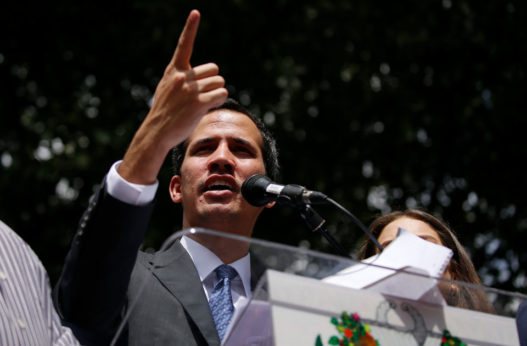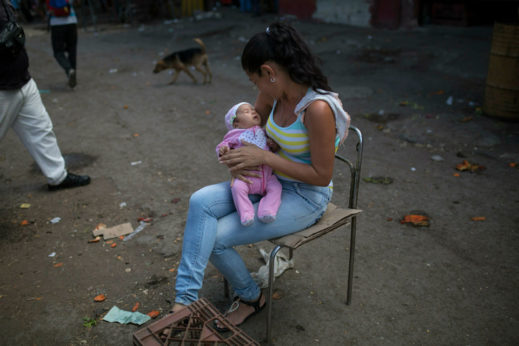
The way some in the media tell it, there are two presidents currently serving in Venezuela. An awkward situation, if appearances are to be believed—but if we know anything by now, it’s that little is as it seems.
This period of confusion started after relative unknown legislator Juan Guaidó declared himself “interim president” last week in Caracas. This announcement was, curiously enough, preceded by a statement from the United States Vice President Mike Pence endorsing Guaidó over Nicolás Maduro, current president and leader of the United Socialist Party of Venezuela (PSUV). Shortly after the “official” proclamation, President Donald Trump anointed Guaidó as his country’s choice.
Allied nations in Latin America and Europe predictably followed suit, while others like Cuba, Russia, Mexico, and China affirmed their neutrality or spoke out against external intervention in Venezuela’s affairs. Western reports have intentionally emphasized the former group while dismissing the latter, creating an overwhelming—and false—consensus favoring one side.

But who makes up this much-discussed opposition? Its chief political organ is the Democratic Unity Roundtable (MUD), a coalition of parties mostly united around their distaste for Maduro. All its constituent bodies deliberately sat out the May 2018 presidential elections, in the hopes a PSUV victory could then be declared illegitimate—and asked the United Nations not to send observers for the same reason. But we’re meant to trust these people are firm believers in the democratic process?
Generally, if one wants a government position in a multi-party system, one runs for that position when election day rolls around. Guaidó did no such thing, claiming the mantle of “president” only when it became clear he would have the support of the U.S. and its allies. Incidentally, unlike the opposition, the PSUV welcomed UN observers to last year’s vote. This, to me, is not something a government running a sham election would do. And though the UN didn’t send anyone, international observers who were present endorsed the process wholeheartedly.
By contrast, over the last several years, violent anti-government protesters have formed roadblocks in busy streets, part of an organized campaign of terrorism. Eyewitnesses reported suspected PSUV sympathizers were set on fire or shot during waves of discontent in 2014 and 2017. Other attacks targeted public services, even a maternity hospital. Despite this, and despite assassination attempts on government officials throughout this period, the opposition only won a single election: a parliamentary vote in 2015, which the country’s Supreme Court contested due to questions of fraud that went unanswered.
Desperate for a legislative supermajority, the MUD parties rejected the courts and seated deputies whose elections were in dispute. This led to an escalation of tensions and a new game plan: boycotts and petitions for outside help. With Trump and Pence’s recognition, that help has certainly arrived.
But let’s not beat around the bush: this is a coup.
Dozens of soldiers were arrested in a failed barracks uprising early last week, and it was revealed last year Trump met with rogue military officials to discuss a potential seizure of power with aid from the U.S. National Security Advisor John Bolton was spotted carrying a notepad with “5,000 troops to Colombia” written on it—probably not an accident. Sanctions have been levied against the state-owned oil monopoly PDVSA, cutting off key revenues for its most important export. U.S. politicians like Sen. Marco Rubio and Bolton have openly courted oil giants Valero and Chevron to do business with Guaidó, hoping to legitimize the “president” with cash infusions.
To that end, European banks have restricted withdrawals of gold by the Venezuelan government, essentially stealing sovereign resources over politics. The same has happened to Venezuela’s public bank holdings in the U.S., which were handed to Guaidó on Tuesday. It seems no method is too cruel when it comes to starving a country already facing enormous economic challenges.
But this is in no way a new phenomenon. The history of the U.S. in Latin America is a long and brutal one, characterized by seemingly contradictory practices—orchestrated upheavals against popular governments who dared to defy capitalist hegemony, and the propping up of unelected military regimes to serve as reliable pawns. There was no consistent application of values like “democracy” or “human rights” when it came to a continent the U.S. saw and still sees, as its own backyard. Rather, this cynical exercise of power was aimed at containing Cold War rivals and asserting global dominance. And despite our present post-Soviet era, very little has changed.
When you go down the list of Central and South American countries who paid in blood for U.S. plotting, it might be easier to name the places that weren’t in the crosshairs. Cuba, Chile, Honduras, Nicaragua, Guatemala, Panama, and El Salvador were victims of U.S. policy at one time or another, to name only a few. The specifics of that policy run the gamut—from clandestine subversion via the Central Intelligence Agency to blockades designed to cripple fledgling economies, all the way to direct military action and assassination plots. The aftershocks of vile programs like Operation Condor are still being felt across the continent today.
Venezuela itself is no exception. In 2002, Maduro’s predecessor, Hugo Chávez, was nearly overthrown by elements fiercely opposed to his platform of wealth redistribution and social welfare. Rebel groups in the military, along with business and religious leaders, attempted to depose Chávez and install a new government that would render the country’s 1999 constitution null and void. It was only through a show of mass support and Chávez’s refusal to resign that the choice of the people was restored, much to the chagrin of the U.S. and its lackeys—who saw opportunity in the country’s vast oil reserves. Sound familiar?

Only a fool would think the forces who masterminded this attempt would give up the fight; no doubt the self-appointed “interim president” is relying on familiar faces for assistance. But this time, the U.S. has more pawns on the chessboard. Countries like Argentina, Brazil, and Colombia have welcomed direct military cooperation with the U.S., with some going as far as establishing foreign military bases on their own soil.
The strategy here is obvious: By flexing political and military muscle and forging relationships with new right-wing leaders such as Brazil’s Jair Bolsonaro, the U.S. hopes to encircle what little resistance remains on the continent in places like Venezuela and Bolivia. Due to its domestic situation, Venezuela is quite vulnerable at the moment, making it the natural test case for this scheme.
English-language media has played its part, nearly uniformly coming out for Guaidó and treating every aspect of the coup as above-board. But the situation is complex, with a history going back much farther than last week. You’ll find none of that nuance from outlets who’ve done their fair share of backing U.S. interests, though—these are the same publications who cheerlead every intervention in the Middle East and apologize for it years later.
The song remains the same. But you’d think we, as readers, would have learned to tune it out by now.












Comments